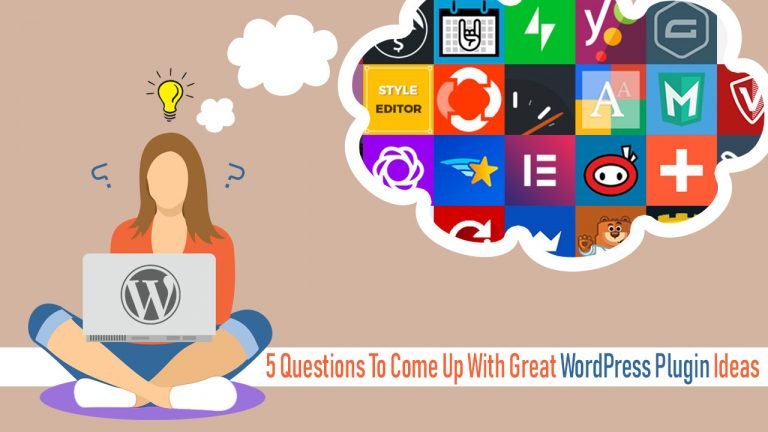
With over fifty thousand plugins currently available on WordPress today, it would be easy for one to think there’s not any real need for new plugins anymore.
But the truth is that new WordPress plugins are being developed all the time in order to make WordPress even more functional and useful.
Basically, a plugin (also known as an add-on) is a software component that adds features to a program. In other words, when a program allows plugins, it means that that program is customizable.
And while you may think that you have to be a professional and talented web developer to come up with new plugin ideas, the reality is that’s not true at all. WordPress users at all levels of experience can facilitate a strong design and guide it into fruition with just a few lines of code.
You may simply want to make your own experience while using WordPress easier, or you may want to be the next Gravity Forms making over $5 million a year from a single plugin. Or maybe you fall somewhere in the middle.
Regardless of where you personally lie on that spectrum, there are just a few things to consider before you start brainstorming that next million-dollar idea. With that said, here are five questions you can ask yourself to come up with truly great WordPress plugin ideas:
1 – What Problems Need To Be Solved?
The first question to ask yourself is: what existing WordPress problems can you solve or would you like to solve?
While this may be the most obvious question to ask yourself, it’s also the most intuitive. When you are trying to come up with a plugin idea you should be thinking about a problem faced by WordPress users that is in grave need of a solution.
The most useful way to generate these ideas is through assessing your own functionality concerns during your day-to-day work routine. What have you noticed to be lacking? How can you make your workload smoother? What security issues do you see?
Chances are if you came across a certain difficulty, other WordPress users have as well, meaning you already have a potential client base.
This also forces you to answer the question of “why?” first. Why users would legitimately need your plugin should be at the beginning of your list when brainstorming. If you develop a plugin “just because,” you will very likely see the same lackadaisical results in downloads.
The old mantra reigns true: never make a product you wouldn’t use yourself.
2 – What Are Some Recent or Evolving Trends?
Tech is one of the fastest changing industries in the history of mankind. If you do not stay regularly up to date on the ebb and flow of the industry you may put in the hard work for a great plugin that has already become irrelevant.
Blogs like Gizmodo, TechCrunch, and How To Geek can help you do just that, giving you the edge to stay ahead of emerging trends.
One example is how Facebook gave rise to the increased popularity of social sharing plugins. Now we have plugins for the vast variety of social media platforms like Instagram, Google+, and Twitter.
Doing your research will also give you a look into plugins that are currently popular and what they are fundamentally trying to achieve. You may be able to improve on an already stable product or be inspired for something new and relevant.
3 – How Can You Automate Processes?
One of the most beneficial and helpful kinds of WordPress plugins are automation plugins, or plugins that essentially automate recurrent tasks for you in order to help boost your efficiency.
It’s not secret that people are always trying to save time and energy while building their online business. If you corner a boring time-consuming task and build a plugin to help automate it, you will be a hero to WordPress users everywhere.
Take the time to write down the two or three most tedious tasks you encounter while working in WordPress AND that don’t already have a plugin developed for them. To give you some ideas, a few examples of recurrent or redundant WordPress tasks that could be in need of automated plugins include scheduling posts, storing full site backups in a secure location, cleaning up your database, or defending your site against common vulnerabilities.
But of course, there may already be WordPress plugins designed to automate those kinds of tasks, which leads us into our next question…
4 – How Can You Simply Improve Existing Plugins?
This goes hand in hand with researching current trends. Within these communities, you may find that there is only one plugin for a specific task and it just isn’t cutting it. From here you can build from what is already a great idea and meet the concerns of its users.
You may also find a plugin that may work perfectly but the developers are charging a small fortune for people to access it. If you can simplify this plugin and offer it for free, you will be able to gain a big edge over your competitors.
This may initially feel like cheating, but it is how new ideas keep the market from becoming stagnant by keeping the consumers at the forefront.
It’s estimated that over a billion dollars are lost every year as a result of slow website speeds. So, using plugins to quicken your website actually improves your bottom line.
5 – Which People Can You Talk To?
The last thing you can do to come up with WordPress plugin ideas is simply to talk to other people who use WordPress.
Take note that you don’t have to ask people outright what their ideas are, because you don’t want to directly steal their ideas. Instead, you can simply talk to people about their WordPress experiences overall, and specifically on what they like and don’t like, which should help you come up with some ideas.
You can also go online, such as to the WordPress community, for more inspiration as well. Again, inquire about other people’s WordPress experiences to find out what they like and don’t like, and based on that information it should be much easier to brainstorm ideas.
Conclusion
These are some of the questions you want to ask yourself before getting started. If you don’t take the time to set your personal goals before developing your idea you are forgetting to serve the most important user, yourself.
Without an end goal in mind, you may be less likely to follow through with the full development. Why would you work towards something when you don’t know what that something is?
Once you have set your goals and start looking, you will find that there is no shortage of plugin ideas. You may find great success financially, or you may just make your own workload easier in the future.
You might just be scratching an itch to help others streamline an already existing process. No matter the reason you decide to start building WordPress plugins, remember to stay focused on your purpose and the rest will fall into place.
